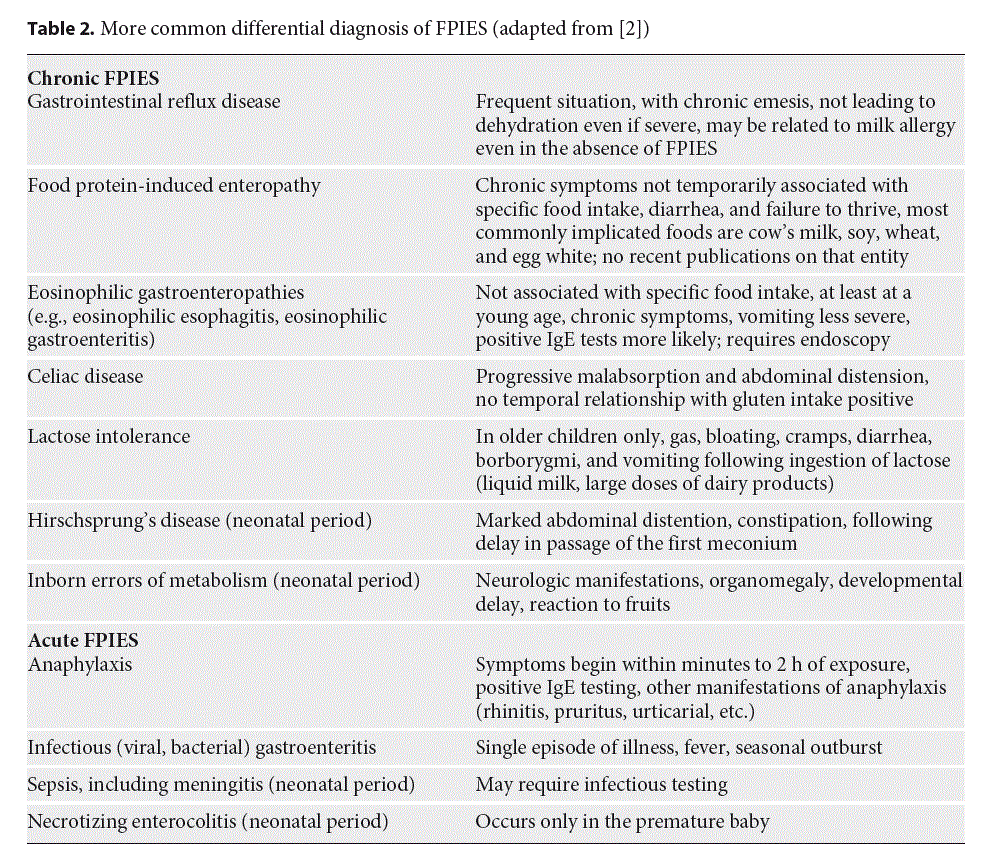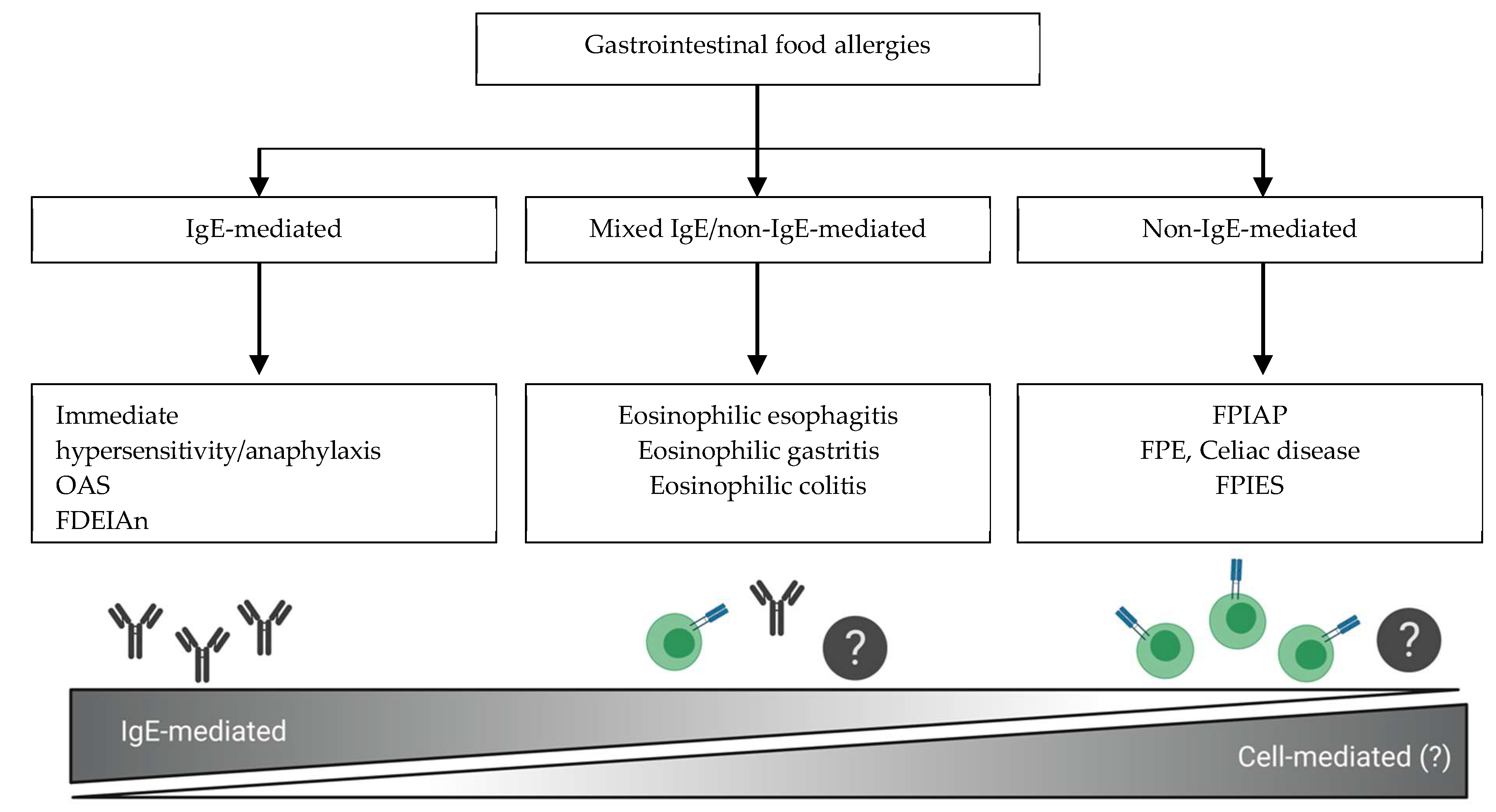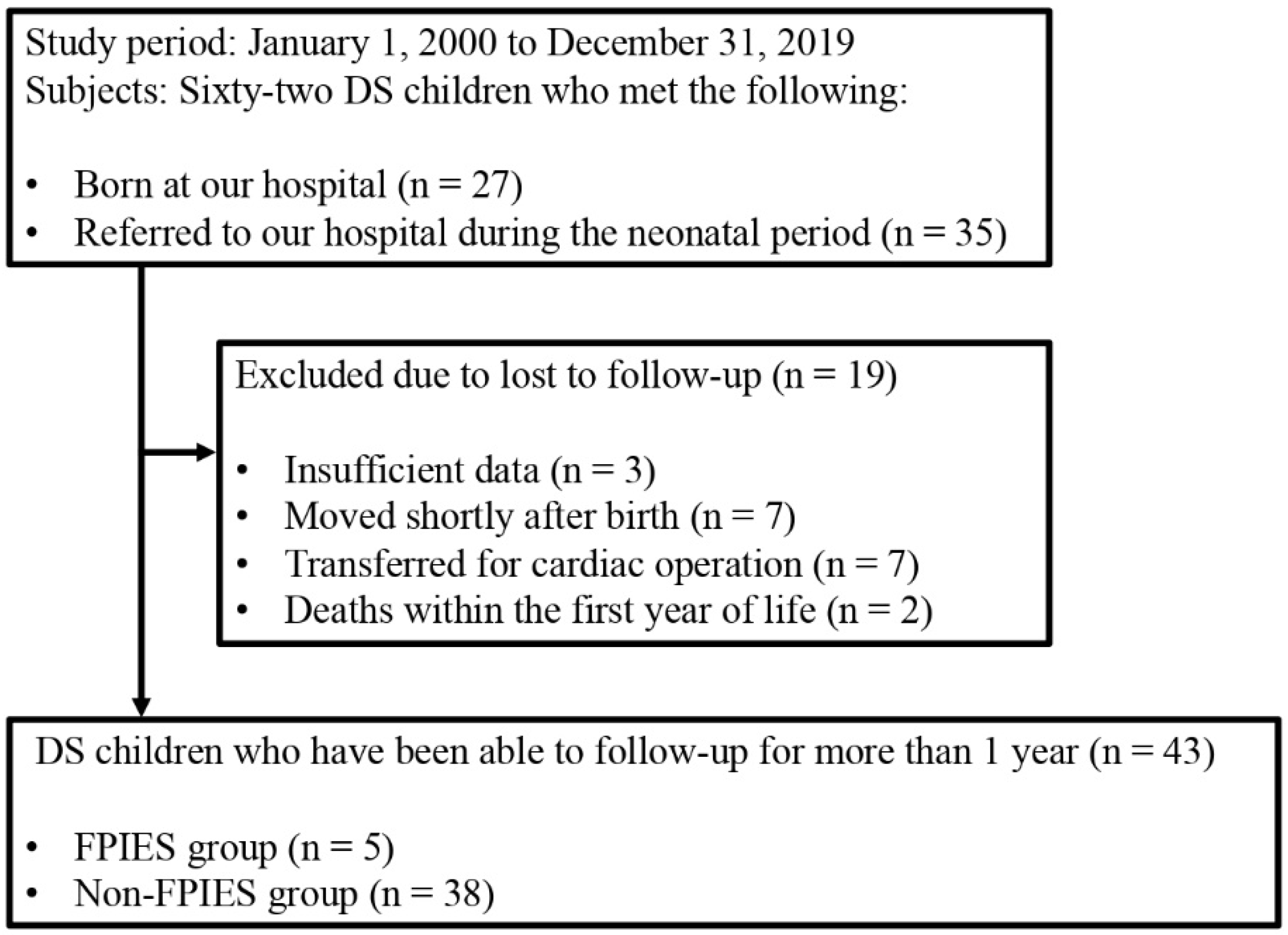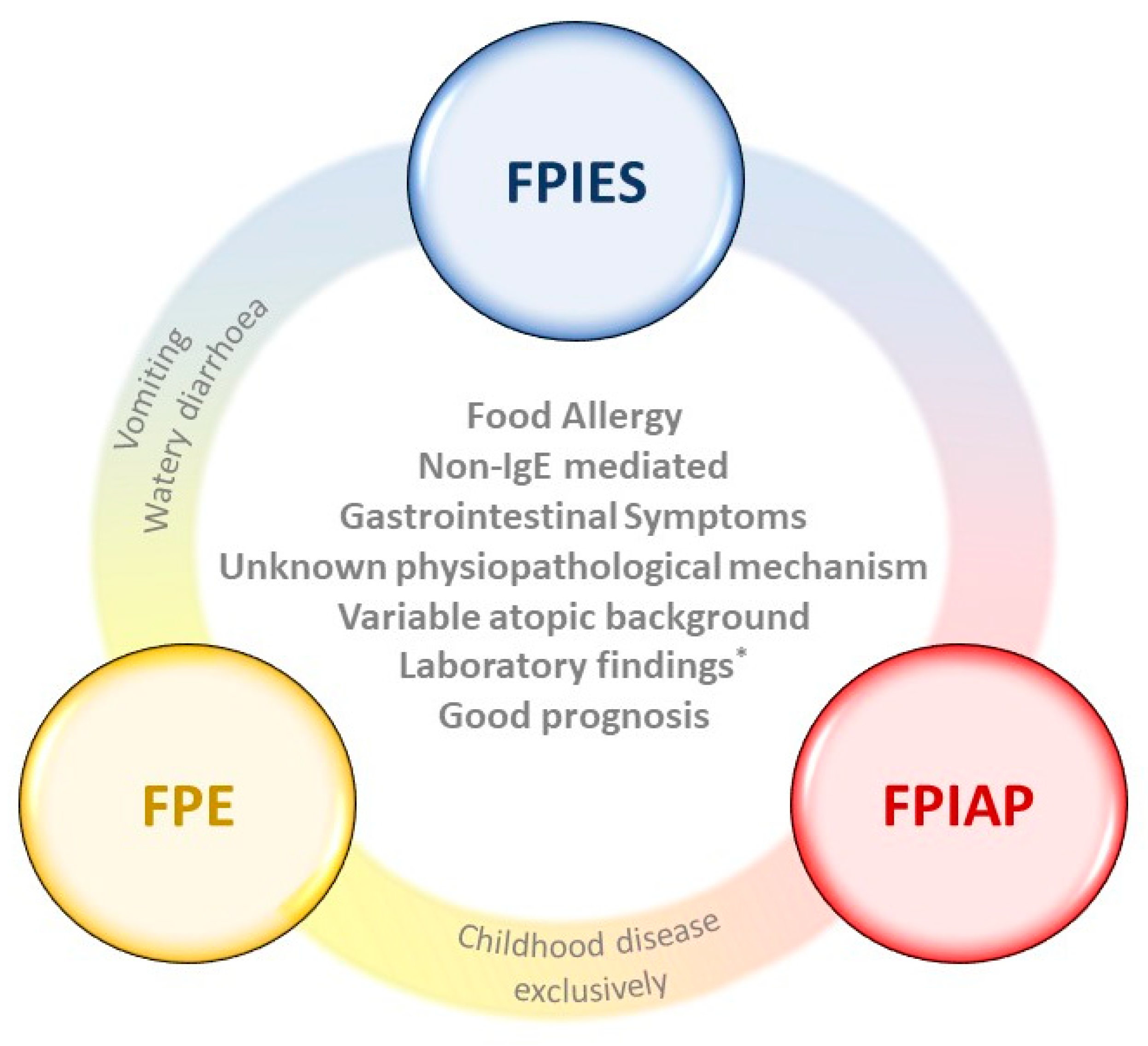food protein-induced enterocolitis syndrome a review of the new guidelines
And clinical outcomes are poorly established. The first International Consensus Guidelines for the Diagnosis and Management of Food Protein-induced Enterocolitis Syndrome were published in 2017 and reviewed epidemiology clinical presentation and prognosis of acute and chronic FPIES.
Food Protein Induced Enterocolitis Syndrome As A Cause For Infant Hypotension The Western Journal Of Emergency Medicine
Food protein-induced enterocolitis syndrome.

. Up to 10 cash back Food protein-induced enterocolitis syndrome FPIES is a non-IgE-mediated food allergy that has been well-characterized clinically yet it is still poorly understood. FPIES usually starts in infancy although onset at older ages is being. Symptoms may include intractable vomiting diarrhea lethargy pallor abdominal distention hypotension andor shock.
Unlike most food allergies symptoms of FPIES do not begin immediately after eating. Food proteininduced enterocolitis FPIES is a non-IgE cell-mediated food allergy that can be severe and lead to shock. FPIES is an under-recognised and frequently mis-.
Cells of the innate immune system appear to be activated during an FPIES reaction. The most characteristic symptom is. Acute FPIES typically presents between one and 4 hours after ingestion of the trigger food with the principal.
Diagnosed syndrome characterised by severe pro-. 9 rows The first International Consensus Guidelines for the Diagnosis and Management of Food. Reactions are characterized by the delayed onset of gastrointestinal symptoms predominantly repetitive vomiting which is often severe and should be considered a medical emergency.
Seafood-induced FPIES may start in adulthood. Up to 10 cash back Food protein-induced enterocolitis syndrome FPIES is an increasingly recognized non-immunoglobulin E IgE-mediated reaction to food. 12 This syndrome is typically characterized by profuse vomiting and lethargy occurring classically 14 hours after ingestion of the offending food.
Cells of the innate immune system appear to be activated during an FPIES reaction. The workgroup outlined clinical phenotypes proposed diagnostic criteria and made recommendations on management. 5 rows Food protein-induced enterocolitis syndrome FPIES is a non-IgE mediated food allergy.
Symptoms may include intractable vomiting diarrhea lethargy pallor abdominal distention hypotension andor shock. The most common food triggers include soy cows milk and grains. Aim of this study was to present the 10-year experience of a referral centre highlighting the atypical FPIES cases and their long-term.
Despite the potential seriousness of reactions awareness of FPIES is low. Food protein-induced enterocolitis syndrome FPIES is a severe presentation of non-IgE-mediated food allergy affecting the gastrointestinal GI tract mainly in infants and young children. The first International Consensus Guidelines for the Diagnosis and Management of Food Protein-induced Enterocolitis Syndrome were published in 2017 and reviewed epidemiology clinical presentation and prognosis of acute and chronic FPIES.
The workgroup outlined clinical phenotypes proposed diagnostic criteria and made recommendations on management. Food protein-induced enterocolitis syndrome FPIES is a poorly understood non-IgE gastrointestinal-mediated food allergy that predominantly affects infants and young children. Food protein-induced enterocolitis syndrome FPIES is a nonIgE-mediated food allergy that manifests with projectile repetitive emesis that can be followed by diarrhea and may be accompanied by lethargy hypotonia hypothermia hypotension and metabolic derangements.
Food protein-induced enterocolitis syndrome FPIES is a non-IgE- cell-mediated food allergy of unknown prevalence and pathophysiology. Cells of the innate immune system appear to be activated during an FPIES reaction. The first International Consensus Guidelines for the Diagnosis and Management of Food Protein-induced Enterocolitis Syndrome were published in 2017 and reviewed epidemiology clinical presentation and prognosis of acute and chronic.
Acute FPIES manifests within 1-4 hours after ingestion with repetitive emesis pallor and lethargy progressing to dehydration and. 3 Diagnosis of FPIES is difficult. Food protein-induced enterocolitis syndrome FPIES is an allergic disease probably non-IgE-mediated with expression predominantly in the GI tract.
Food Protein-Induced Enterocolitis Syndrome FPIES is a clinically well-characterised non-Immunoglobulin E IgE-mediated food allergy syndrome yet its rare atypical presentation remains poorly understood. Food protein-induced enterocolitis syndrome FPIES is an uncommon disorder characterized by an allergic reaction to food that affects the gastrointestinal system. While the pathophysiology of FPIES is poorly understood the clinical presentation of acute FPEIS reactions has been well characterized.
Food protein-induced enterocolitis syndrome FPIES is a non-IgE mediated food allergy presenting in infants younger than 12 months. Food protein-induced enterocolitis syndrome FPIES is a rare food allergy that affects the gastrointestinal GI tract. Individuals with FPIES experience profuse vomiting and diarrhea that usually develops.
Oral food challenges OFCs given at food protein dose. Instead it can take hours before severe symptoms begin. Acute FPIES typically presents between one and 4 hours after ingestion of the trigger food with the principal.
Onset is typically during the first year of life. Tracted diarrhoea andor vomiting and. The most common food triggers include soy cows milk and grains.
Food Protein-Induced Enterocolitis Syndrome FPIES is a non-IgE mediated food allergy most commonly presenting in infants. The term enterocolitis specially refers to inflammation of the small and large intestines. Food Protein-Induced Enterocolitis Syndrome FPIES is a non-IgE mediated food allergy most commonly presenting in infants.
High-quality studies providing insight into the pathophysiology diagnosis and management are lacking. Food proteininduced enterocolitis syndrome FPIES is a poorly understood nonIgE gastrointestinalmediated food allergy that predominantly affects infants and young children. Food protein-induced enterocolitis syndrome FPIES is a poorly understood non-IgE gastrointestinal-mediated food allergy that predominantly affects infants and young children.
Acute FPIES is characterized by vomiting 14h andor diarrhea within 24h after ingestion of a culprit food. Acute FPIES typically presents between one and 4 hours after in -.

Interpretation Of The Food Protein Induced Enterocolitis Syndrome Oral Download Table

Oral Food Challenge In Food Protein Induced Enterocolitis Syndrome Download Table

Food Protein Induced Enterocolitis Syndrome The Journal Of Allergy And Clinical Immunology In Practice

Food Protein Induced Enterocolitis Syndrome Fpies Pediatric Focus

Food Protein Induced Enterocolitis Syndrome And Proctocolitis

Clinical Types Of Food Protein Induced Enterocolitis Syndrome Fpies Download Scientific Diagram

Pdf International Consensus Guidelines For The Diagnosis And Management Of Food Protein Induced Enterocolitis Syndrome Executive Summary Workgroup Report Of The Adverse Reactions To Foods Committee American Academy Of Allergy Asthma Immunology

Clinical Types Of Food Protein Induced Enterocolitis Syndrome Fpies Download Scientific Diagram

International Consensus Guidelines For The Diagnosis And Management Of Food Protein Induced Enterocolitis Syndrome Executive Summary Workgroup Report Of The Adverse Reactions To Foods Committee American Academy Of Allergy Asthma Immunology Journal

Food Protein Induced Enterocolitis Syndrome Fpies Pediatric Focus

Clinical Manifestations Of Food Protein Induced Enterocolitis Syndrome Download Scientific Diagram

Advances In Understanding Immune Mechanisms Of Food Protein Induced Enterocolitis Syndrome Annals Of Allergy Asthma Immunology

Nutrients Free Full Text Non Ige Mediated Gastrointestinal Food Allergies In Children An Update Html

Food Protein Induced Enterocolitis Syndrome Annals Of Allergy Asthma Immunology

Nutrients Free Full Text Food Protein Induced Enterocolitis Syndrome In Children With Down Syndrome A Pilot Case Control Study Html

Food Protein Induced Enterocolitis Syndrome Oral Food Challenge Annals Of Allergy Asthma Immunology

Management Of Acute Food Protein Induced Enterocolitis Syndrome Emergencies At Home And In A Medical Facility Annals Of Allergy Asthma Immunology

References In Food Protein Induced Enterocolitis Syndrome Not So Rare After All Journal Of Allergy And Clinical Immunology

Foods Free Full Text Non Ige Mediated Gastrointestinal Food Protein Induced Allergic Disorders Clinical Perspectives And Analytical Approaches Html